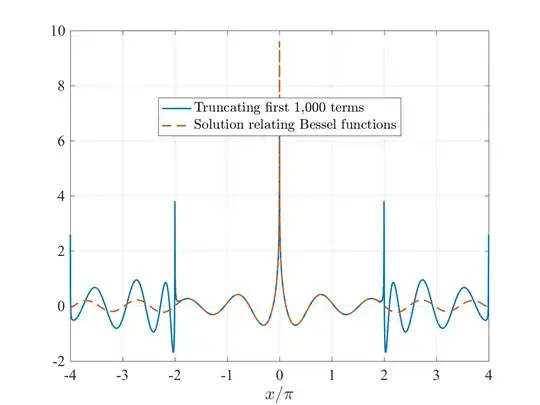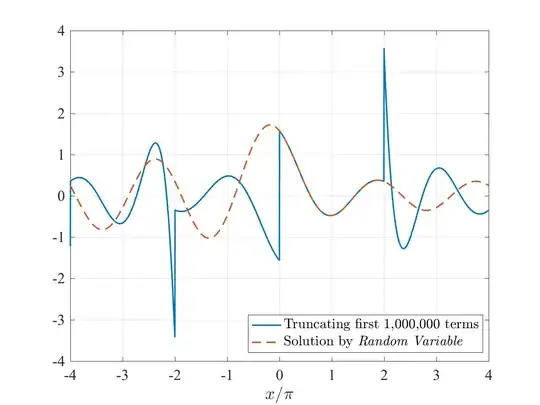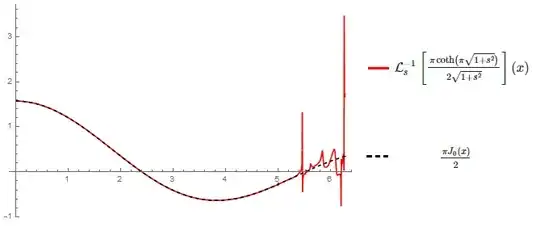Here I want to get the closed form solution of the following summation
$$ \sum_{n=1}^\infty \frac{\sin\sqrt{n^2+1}}{\sqrt{n^2+1}} \qquad(1) $$
Or the more general form ($x$ be an arbitrary real number, and $a\geq0$ is a constant):
$$ f_a(x) = \sum_{n=1}^\infty \frac{\sin\left(x\sqrt{n^2+a^2}\right)}{\sqrt{n^2+a^2}}\qquad(2) $$
I tried the numeircal simulations before I post the question. I truncated the first $1,000,000$ terms of equation (1) and it turned $0.781233190560320$.
Anyone can help me?
In fact, I made it the reduced case when $a=0$. It can be proved by Fourier series: $$ f_0(x)=\sum_{n=1}^\infty \frac{\sin nx}{n} = \left\{ \matrix{\dfrac{\pi-x}{2}, 0<x<2\pi\\0, x=0,2\pi} \right. $$ And the function is periodical: $$ f_0(x) = f_0(x+2\pi) $$
Edit: How about this one? $$ g_a(x) = \sum_{n=1}^\infty \frac{\cos\left(x\sqrt{n^2+a^2}\right)}{\sqrt{n^2+a^2}}\qquad(3) $$
We get the "diverging wave solution" in physics when we combine the equation (2) and (3): $$ h_a(x)=g_a(x)+\text{i}f_a(x)=\sum_{n=1}^\infty \frac{\exp\left(\text{i}x\sqrt{n^2+a^2}\right)}{\sqrt{n^2+a^2}}\qquad(4) $$
Edit #2: I tested the solution solved by Random Variable (see the most ranked answer and thousands thanks to it!) compared with the truncating results:
$$ \sum_{n=1}^N\frac{\sin \left(x\sqrt{n^2+a^2}\right)}{\sqrt{n^2+a^2}}, N = 1,000,000, a=1 $$
Here is the solution by @Random Variable: the solution of equation (2) as the following:
$$ \sum_{n={1}}^\infty \frac{\sin\left(x\sqrt{n^2+a^2}\right)}{\sqrt{n^2+a^2}} = \frac{\pi}{2} J_0(ax) -\frac{\sin(ax)}{2a}, a>0, 0<x<2\pi\qquad(2*) $$ where $J_0(ax)$ is the Bessel function of the first kind of order zero.
It can be found that the both agree well when $0 <x<2\pi$,but differ in other domain. So, how about the solution beyond $(0,2\pi)$?
Edit #3:
Inspired by Random Variable's answer, I found the solution of equation (3) as the following:
$$ \sum_{n={1}}^\infty \frac{\cos\left(x\sqrt{n^2+a^2}\right)}{\sqrt{n^2+a^2}} = -\frac{\pi}{2} Y_0(ax) -\frac{\cos(ax)}{2a}, a>0, 0<x<2\pi\qquad(3*) $$ where $Y_0(ax)$ is the Bessel function of the second kind of order zero.
Here is the comparison:
 Note that equation (3) is divergent when $x=0$.
Note that equation (3) is divergent when $x=0$.
Possible relating QUESTIONS:

